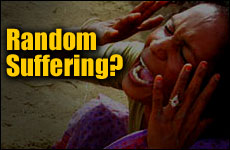 You Know More Hebrew Words Than You Think
You Know More Hebrew Words Than You Think


5 min read
Not a chance. Adversity -- wherever it strikes, whomever it takes and whomever its spares -- always has a reason, even when it cannot be discerned.
As formidable as the wall of water that obliterated Indian Ocean coastlines last month are the questions, about God, fate and chastisement that the tsunami left on the shores.
Some chose to see in the catastrophe only further support for their conviction that there is no Supreme Being. If there were, they proclaimed, how could He possibly have allowed such loss of life, limbs and homes? Others, like Azizan Abdul Razak, a Muslim cleric in Malaysia, saw the disaster as a simple reminder from G-d that "He created the world and can destroy the world."
Yet others, like Greek Orthodox theologian Costas Kyriakides, somehow managed to combine a belief in a Divine Being with something bordering on His disassociation from the world. "I don't personally attach any theological significance to this," he said.
An American Reform rabbi, Shira Milgrom, who was in India when the tsunami struck, expressed a similar detachment of God from human affairs, saying about those, herself included, who managed to flee before the wave, "It is not by the grace of God... this is luck."
The stance of the Jewish religious tradition, though, is well evidenced in its literature throughout the ages -- ages that supplied no small amount of tragically trying times for Jews. What Judaism teaches is that adversity -- wherever it strikes, whomever it takes and whomever its spares -- always has a reason, even when it cannot easily -- or at all -- be discerned.
That goes for adversity of every sort and scale. The question "Why?" being asked by so many over recent weeks is a ubiquitous one. But it is a question that, even unanswered, cannot challenge the conviction that a Creator has endowed our lives with meaning.
"Either belief in God is unconditional," he wrote, "or it is not belief at all."
Victor Frankl, the eminent psychotherapist and survivor of Auschwitz, may have put it best. "Either belief in God is unconditional," he wrote, "or it is not belief at all."
"If it is unconditional," he explains, "it will stand and face the fact that six million died in the Nazi Holocaust; if it is not unconditional it will fall away if only a single innocent child has to die... There is no point in bargaining with God, say, by arguing: 'Up to six thousand or even one million victims of the Holocaust I maintain my belief in Thee; but from one million upward nothing can be done any longer and I am sorry but I must renounce my belief in Thee.'
And so, the Jewish response to all disaster is to regard what has happened as, even if entirely confounding, somehow still entirely just -- the essence, in fact, of the Jewish blessing recited upon personal tragedy: "Baruch Ata...Dayan Ha'emet" - "Blessed are You... the true Judge." And to engage in introspection.
No one but a prophet can associate any tragedy with any particular sin, but sin is not difficult to discern in our world, or in ourselves. Materialism and immorality are pandemic in our world; tribal and religious strife, terrorism and claims of divine directives to kill and maim are embraced, even celebrated, by large swaths of humanity. Might a message about any or all of those things lie in the sorrow sown by the recent waves of destruction? One hopes that those whom the shoes may fit elect to wear them.
But then there is the fact that each of us is a microcosm, with failed challenges of his or her own -- which Jewish sources in fact consider to feed larger societal failings. We may not personally act immorally or murderously, but there are more subtle realms of evil. The Talmud, for instance, speaks of malicious gossip as a sort of murder, and considers unwarranted hatred to be a wildly destructive force.
Which is why the response of many rabbis who represent the fullness of the Jewish heritage has been a generalized call to repentance. Let all who have been anguished by the tsunami's terrible toll, each nation, each culture, each people and each person, do whatever it or they or he or she may feel is necessary. But let there be a response, not a dismissal. Let us recognize, in other words, that God guides the world, and that, despite the appearance of randomness or capriciousness, nothing happens without a reason.
In the realm of the visible, there are encouraging signs. The outpouring of aid from Western nations to the survivors of the tsunami has been astounding; and in one of the hardest hit countries, Sri Lanka, Tamil rebels have reportedly worked together with government troops to repair roads and lives in the aftermath of the disaster. One can only hope that people the world over, in addition to opening their wallets, have opened their minds as well, and examined who they are in the light of who they should be.
Because, while we cannot know what or whose spiritual failings might have rendered innocent people vulnerable to the recent natural disaster, one thing authentic Judaism insists is that it was not a matter of chance.
Am Echad Resources
